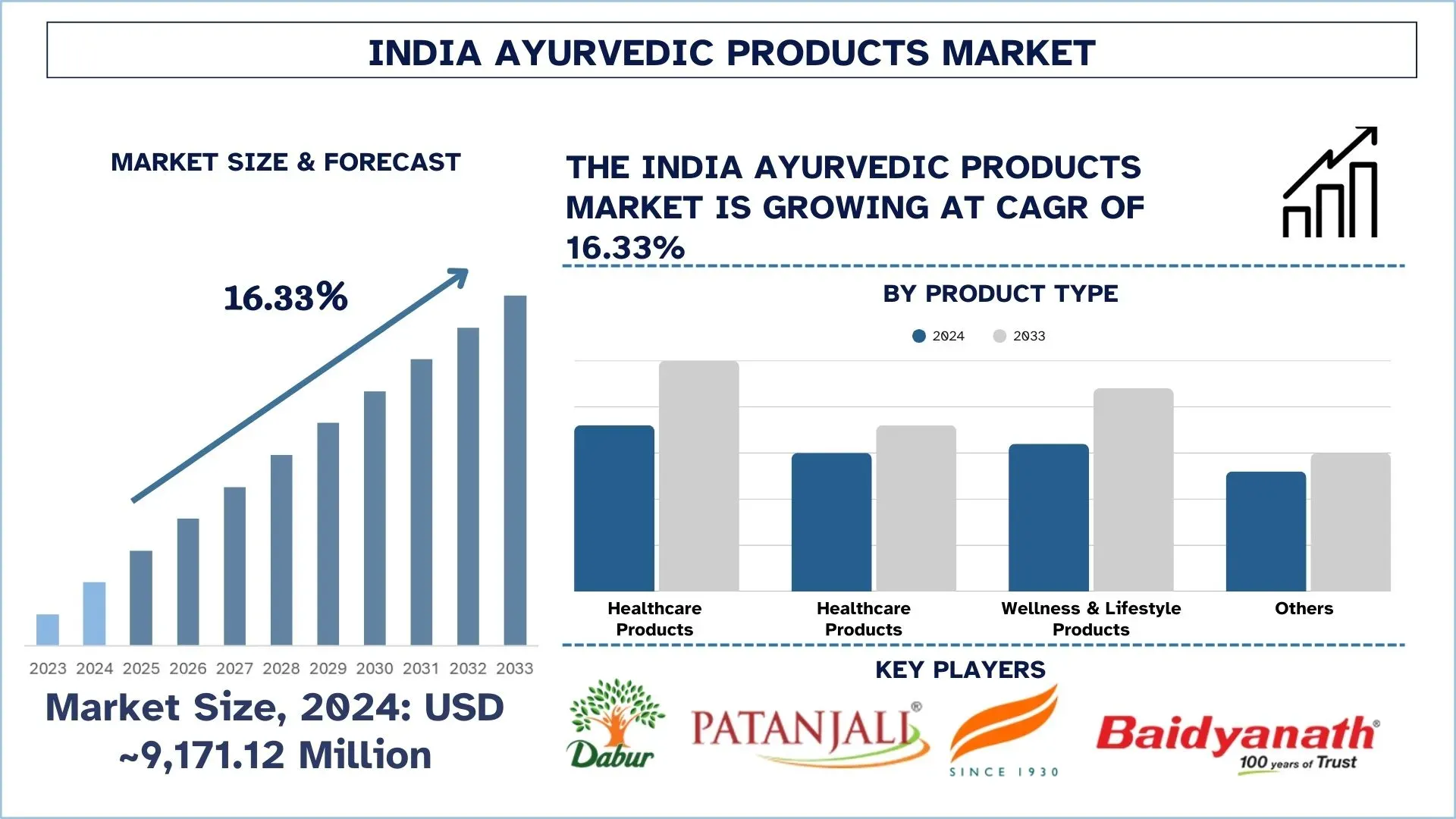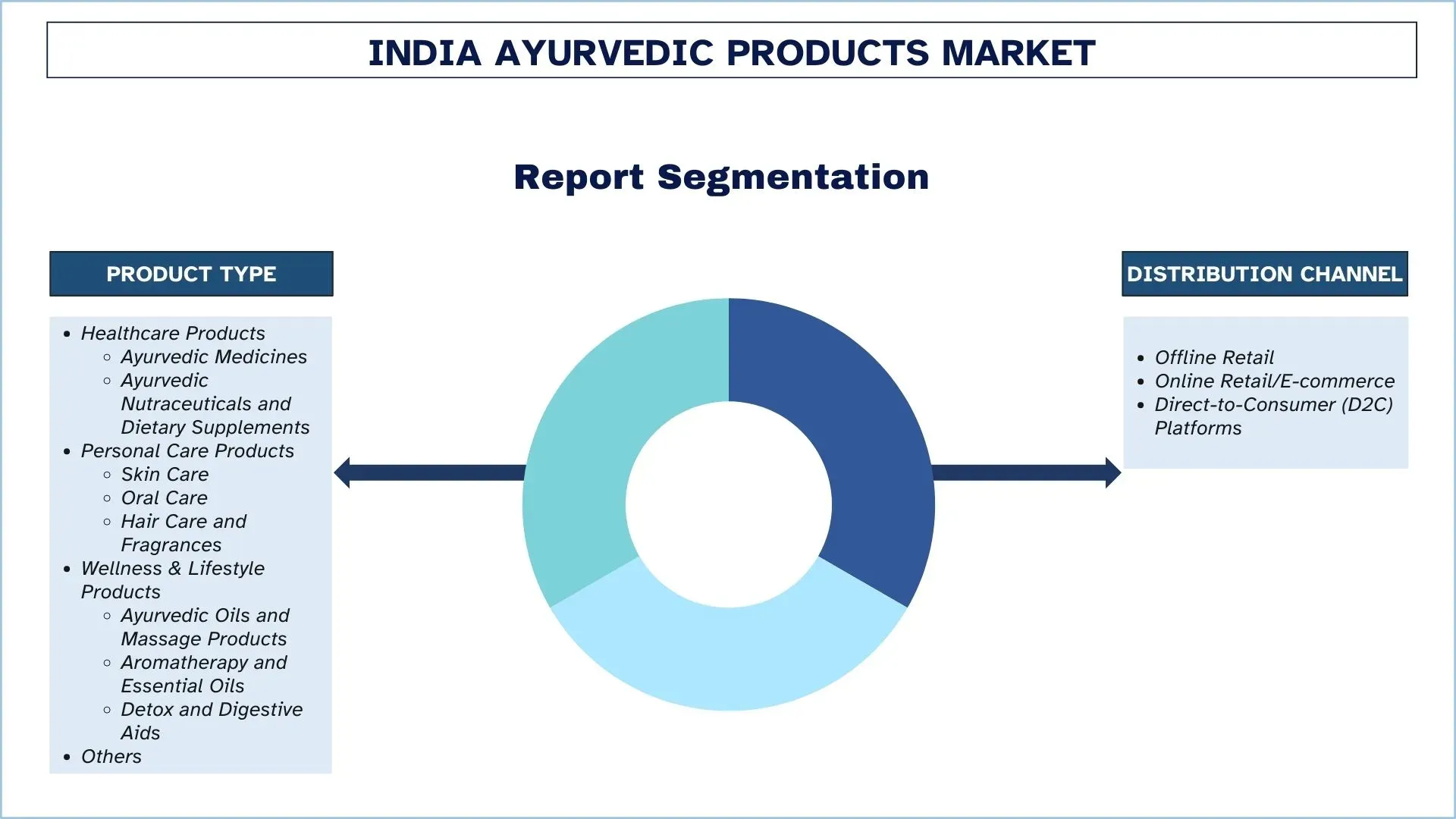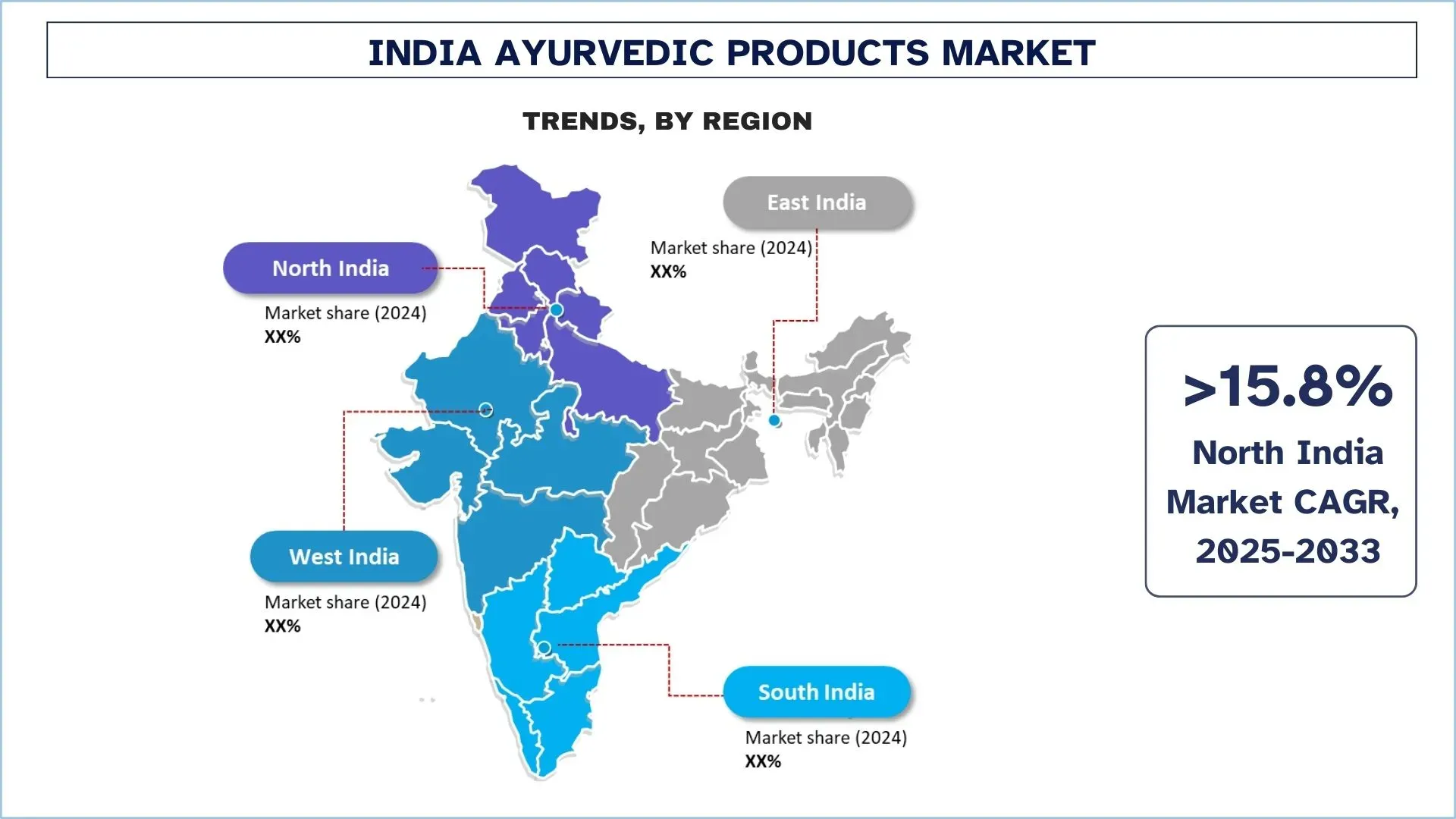- Home
- About Us
- Industry
- Services
- Reading
- Contact Us
India Ayurvedic Products Market: Current Analysis and Forecast (2025-2033)
Emphasis on Product Type (Healthcare Products: Ayurvedic Medicines, Ayurvedic Nutraceuticals and Dietary Supplements; Personal Care Products: Skin Care, Oral Care, Hair Care and Fragrances; Wellness & Lifestyle Products: Ayurvedic Oils and Massage Products, Aromatherapy and Essential Oils, Detox and Digestive Aids; Others); Distribution Channel (Offline Retail, Online Retail/E-commerce, Direct-to-Consumer (D2C) Platforms) and Region/States

India Ayurvedic Products Market Size & Forecast
The India Ayurvedic Products Market was valued at USD ~9,171.12 million in 2024 and is expected to grow to a strong CAGR of around 16.33% during the forecast period (2025-2033F), owing to the increasing consumer focus on preventive healthcare and natural remedies.
Ayurvedic Products Market Analysis
Ayurvedic products are medicines originating from India that are derived from the Ayurvedic system of treatment, which is also referred to as an ancient Indian healing system. These products comply with natural herbs, minerals, and plant compounds, which have the capabilities and benefits of enhancing health, controlling diseases, and attaining homeostasis within the body. They include medicines, dietary supplements, skincare products, hair products, oils, and wellness enhancement kits.
To achieve growth in the ayurvedic products market, currently famous Ayurvedic producers in India, such as Dabur, Patanjali, Himalaya, and Baidyanath, are engaged in R&D activities, digital promotion, and modern packaging to target the populace. They are adding Ayurvedic nutraceuticals, immunity-enhancing products, and an organic range of personal care products to their product list. Top firms are also inclining towards e-commerce and direct economy, opening Ayurvedic clinics and partnering with the Ministry of AYUSH for standardization and approval to capture a large market share.
For instance, on January 05, 2025, in a momentous step towards advancing healthcare and promoting traditional medicine, Prime Minister Shri Narendra Modi laid the foundation stone (virtually) of the Central Ayurveda Research Institute in Rohini and termed it as the “Ayurveda’s next big leap”. The ceremony was attended by Shri Prataprao Jadhav, Union Minister of State (Independent charge), Ministry of Ayush, and other dignitaries.
India Ayurvedic Products Market Trends
This section discusses the key market trends that are influencing the various segments of the India Ayurvedic Products market, as found by our team of research experts.
Integration of Tech such as AI, Wearables & Personalization
Ayurvedic firms are promoting technologies attached to the body, AI to provide healthcare services concerning the customers’ doshas and health information. Currently, there exists a variety of digital apps that suggest individualized Ayurvedic diets and supplements, as well as an individual’s lifestyle. This digital process of segmentation and targeting helps reach young customers and increase their involvement. It also enables brands to acquire essential user data that can be used to improve the existing products further. It is also being incorporated in Ayurvedic education as a tool to carry out simulations and as a means of delivering education to students.
For example, on March 17, 2025, the Ministry of Ayurveda, Yoga, and Naturopathy, Unani, Siddha, and Homoeopathy (Ayush) incorporated Artificial Intelligence (AI) into the Undergraduate (UG) and Postgraduate (PG) curricula to modernize the Indian Systems of Medicine (ISM).
This initiative aims to equip students with a strong foundation in traditional medicine while incorporating modern technological advancements to improve healthcare delivery and research.
Ayurvedic Products Industry Segmentation
This section provides an analysis of the key trends in each segment of the India Ayurvedic Products market report, along with forecasts at the regional and state levels for 2025-2033.
The healthcare products market held the dominant share of the ayurvedic products market in 2024.
Based on the product type, the market is segmented into healthcare products: ayurvedic medicines, ayurvedic nutraceuticals and dietary supplements; personal care products: skin care, oral care, hair care and fragrances; wellness & lifestyle products: ayurvedic oils and massage products, aromatherapy and essential oils, detox and digestive aids; and others. Among these, the healthcare ayurvedic products market held the dominant share of the market in 2024. The increase in the number of lifestyle disorders, along with the shift of focus on preventive care, has further driven the growth of ayurvedic product manufacturers in India. The urban consumers are increasingly relying on Ayurvedic medicines and nutraceuticals for immunity, digestion, and stress-related issues. Consequently, this has promoted the expansion of the classical and proprietary brand products within a firm, enhancing its market intensity. In October 2024, Nutrabay, India’s pioneering D2C sports nutrition and wellness brand, ventured into the Ayurvedic supplements market with the launch of its debut product in the segment, Shilajit. With the launch of Shilajit, Nutrabay aims to gain market share from the existing Shilajit market.
The Online retail/e-commerce segment is expected to grow with a significant CAGR during the forecast period (2025-2033) of the ayurvedic products Market.
Based on the distribution channel, the market is segmented into offline retail, online retail/e-commerce, and direct-to-consumer (D2C) platforms. Among these, the online retail/e-commerce segment is expected to grow with a significant CAGR during the forecast period (2025-2033) because of the increase in the use of online platforms for selling, buying, and consuming goods, Ayurvedic products are easily accessible by consumers in Tier-II and Tier-III cities. To successfully meet the target consumers, modern companies are using third-party sites such as Amazon, Nykaa, among others, or pen house channels. It has increased the pace for brand awareness, product testing, and buying decisions among consumers in the Indian e-commerce market. For example, on 08 February 2022, Amazon India announced the launch of a dedicated storefront for Ayurveda products on its marketplace (Amazon.in). Officially launched by Shri Sarbananda Sonowal, Hon’ble Union Cabinet Minister, Ministry of Ayush, the storefront will enhance the visibility of unique Ayurveda products such as various kinds of juices, skin-care supplements, immunity boosters, oils, and more from small businesses and D2C brands.

North India leads the Ayurvedic Products Market in 2024.
The northern part of India, the main source of Ayurvedic products, including Haridwar and the manufacturing plant of Baba Ramdev’s Patanjali, also plays a significant role in the growth. These states, like UP, Delhi, Punjab, and Haryana, have established demand for the ayurvedic products in the health and personal care industry due to health consciousness and the traditional use of the same. The large population and the increasing number of retail outlets contribute to the uptake of the products. The emerging interest is also suggestive of the increased focus towards an integrative health system in North India, and modern medical institutions in Delhi are quickly integrating Ayurveda into their system.
For instance, on March 25, 2025, the Ministry of Ayush and MoH&FW jointly established Integrated Ayush Departments in Central Government Hospitals to promote integrative healthcare. As part of this initiative, Department of Integrative Medicine has been set up and is operational at Vardhman Mahavir Medical College & Safdarjung Hospital and Lady Hardinge Medical College, New Delhi through All India Institute of Ayurveda (AIIA), New Delhi and Central Ayurveda Research Institute (CARI), Punjabi Bagh, New Delhi respectively. No separate funding is allocated for establishing these centres.

Ayurvedic Products Industry Competitive Landscape
The India Ayurvedic Products market is competitive, with several global and international market players. The key players are adopting different growth strategies to enhance their market presence, such as partnerships, agreements, collaborations, new product launches, geographical expansions, and mergers and acquisitions.
Top India Ayurvedic Products Companies
Some of the major players in the market are DABUR Limited, Patanjali Ayurved Limited, Himalaya Wellness Company, Zandu Care (Emami Group), Shree Baidyanath Ayurved Bhawan Private Limited, Charak Pharma Pvt Ltd, Maharishi Ayurveda Products Pvt Ltd, Sandu Pharmaceuticals Limited, Swastik Ayurveda, Navayur Herbals.
Recent Developments in the India Ayurvedic Products Market
On July 2024, Zydus Wellness, an FMCG major, expanded its offerings under the brand Complan with the launch of immunity-boosting drink, Complan Immuno-Gro in Tamil Nadu. Designed to provide strong immunity while supporting growth and memory among children, Complan Immuno-Gro is formulated with a unique blend of more than 20 Ayurvedic herbs, such as Amla, Ashwagandha, and Brahmi.
On December 12, 2022, Kerala Ayurveda Limited (KAL) announced that it has received its first patent from the United States Patent and Trademark Office (USPTO) for a proprietary herbal formulation that is uniquely processed and inspired by ancient ayurvedic wisdom. The company made the announcement during the 9th World Ayurveda Congress and Arogya Expo 2022.
India Ayurvedic Products Market Report Coverage
Report Attribute | Details |
Base year | 2024 |
Forecast period | 2025-2033 |
Growth momentum | Accelerate at a CAGR of 16.33% |
Market size 2024 | USD ~9,171.12 million |
Regional analysis | North India, South India, East India, and West India |
Major contributing region | South India is expected to grow at the highest CAGR during the forecasted period. |
Companies profiled | DABUR Limited, Patanjali Ayurved Limited, Himalaya Wellness Company, Zandu Care (Emami Group), Shree Baidyanath Ayurved Bhawan Private Limited, Charak Pharma Pvt Ltd, Maharishi Ayurveda Products Pvt Ltd, Sandu Pharmaceuticals Limited, Swastik Ayurveda, Navayur Herbals |
Report Scope | Market Trends, Drivers, and Restraints; Revenue Estimation and Forecast; Segmentation Analysis; Demand and Supply Side Analysis; Competitive Landscape; Company Profiling |
Segments Covered | By Product type, By Distribution channel, By Region/Country |
Reasons to Buy the India Ayurvedic Products Market Report:
The study includes market sizing and forecasting analysis confirmed by authenticated key industry experts.
The report briefly reviews overall industry performance at a glance.
The report covers an in-depth analysis of prominent industry peers, primarily focusing on key business financials, type portfolios, expansion strategies, and recent developments.
Detailed examination of drivers, restraints, key trends, and opportunities prevailing in the industry.
The study comprehensively covers the market across different segments.
Deep dive regional level analysis of the industry.
Customization Options:
The India Ayurvedic Products market can further be customized as per the requirements or any other market segment. Besides this, UnivDatos understands that you may have your own business needs; hence, feel free to contact us to get a report that completely suits your requirements.
Table of Content
Research Methodology for the India Ayurvedic Products Market Analysis (2023-2033)
We analyzed the historical market, estimated the current market, and forecasted the future market of the India Ayurvedic Products market to assess its application in major regions in India. We conducted exhaustive secondary research to gather historical market data and estimate the current market size. To validate these insights, we carefully reviewed numerous findings and assumptions. Additionally, we conducted in-depth primary interviews with industry experts across the Ayurvedic Products value chain. After validating market figures through these interviews, we used both top-down and bottom-up approaches to forecast the overall market size. We then employed market breakdown and data triangulation methods to estimate and analyze the market size of industry segments and sub-segments.
Market Engineering
We employed the data triangulation technique to finalize the overall market estimation and derive precise statistical numbers for each segment and sub-segment of the India-Ayurvedic Products market. We split the data into several segments and sub-segments by analyzing various parameters and trends, including product type, distribution channel, and regions within the India Ayurvedic Products market.
The Main Objective of the India Ayurvedic Products Market Study
The study identifies current and future trends in the India Ayurvedic Products market, providing strategic insights for investors. It highlights regional market attractiveness, enabling industry participants to tap into untapped markets and gain a first-mover advantage. Other quantitative goals of the studies include:
Market Size Analysis: Assess the current market size and forecast the market size of the India Ayurvedic Products market and its segments in terms of value (USD).
Ayurvedic Products Market Segmentation: Segments in the study include areas of product type, distribution channel, and regions.
Regulatory Framework & Value Chain Analysis: Examine the regulatory framework, value chain, customer behavior, and competitive landscape of the Ayurvedic Products industry.
Regional Analysis: Conduct a detailed regional analysis for key areas such as North India, South India, East India, and West India.
Company Profiles & Growth Strategies: Company profiles of the Ayurvedic Products market and the growth strategies adopted by the market players to sustain in the fast-growing market.
Frequently Asked Questions FAQs
Q1: What is the India Ayurvedic Products market’s current market size and growth potential?
The India Ayurvedic Products market was valued at USD ~9,171.12 million in 2024 and is expected to grow at a CAGR of 16.33% during the forecast period (2025-2033). This growth is driven by growing consumer preference for preventive healthcare, and herbal alternatives are fueling demand for Ayurvedic products.
Q2: Which segment has the largest share of the India Ayurvedic Products market by product type?
The Healthcare Products segment holds the largest share of the India Ayurvedic Products market in 2024, driven by increasing demand for ayurvedic medicines, herbal supplements, and immunity boosters. Consumers are increasingly opting for chemical-free and plant-based alternatives for preventive healthcare, making this segment a key contributor to overall market revenue.
Q3: What are the driving factors for the growth of the India Ayurvedic Products market?
The rising health and wellness awareness, government support through AYUSH initiatives, higher spending power fueling demand for premium ayurvedic products, growth of e-commerce and D2C ayurvedic brands, integration of ayurveda with modern science, increased investments and brand innovations, wider acceptance among the younger population.
Q4: What are the emerging technologies and trends in the India Ayurvedic Products market?
Emerging trends include the rise of AyurTech—integration of AI, machine learning, and IoT with Ayurvedic diagnostics and personalized wellness solutions. Other key trends include the digitization of ayurvedic consultations, customized formulations based on body types (Prakriti), the growth of clean-label and organic certifications, and the increasing popularity of functional foods and beverages with Ayurvedic ingredients like turmeric, ashwagandha, and giloy. Additionally, blockchain is being explored for traceability and supply chain transparency in Ayurvedic sourcing.
Q5: What are the key challenges in the India Ayurvedic Products market?
Major challenges include the lack of standardized regulations and quality certifications, which hinder large-scale commercialization and exports. There's also limited scientific validation of some formulations, impacting credibility among urban and global consumers. Other hurdles include raw material supply chain inefficiencies, adulteration concerns, competition from allopathy and nutraceuticals, and fragmentation in the domestic ayurvedic SME sector, which impacts scalability and consistency.
Q6: Which region dominates the India Ayurvedic Products market?
North India dominates the India Ayurvedic Products market due to the strong historical roots of Ayurveda in this region, availability of herbal raw materials from the Himalayan belt, presence of legacy ayurvedic manufacturers like Dabur and Baidyanath, and a robust consumer base across states like Uttar Pradesh, Delhi, Haryana, and Punjab. Additionally, increasing demand from wellness tourism hubs like Rishikesh and Haridwar is further driving regional growth.
Q7: Who are the key players in the India Ayurvedic Products market?
Some of the leading companies in the India Ayurvedic Products Industry include:
• DABUR Limited
• Patanjali Ayurved Limited
• Himalaya Wellness Company
• Zandu Care (Emami Group)
• Shree Baidyanath Ayurved Bhawan Private Limited
• Charak Pharma Pvt Ltd
• Maharishi Ayurveda Products Pvt Ltd
• Sandu Pharmaceuticals Limited
• Swastik Ayurveda
• Navayur Herbals
Q8: What are the investment opportunities in the India Ayurvedic Products market for businesses and private equity firms?
With the market expected to grow at a CAGR of 16.33% through 2033, investment opportunities are abundant in direct-to-consumer (D2C) ayurvedic brands, AyurTech startups integrating AI and Ayurveda, personalized wellness, and exports. Strategic alliances, acquisitions, and product innovation partnerships are also gaining traction among investors looking to expand in Tier II and III cities and international markets.
Q9: How are regulatory frameworks and government initiatives shaping the India Ayurvedic Products market?
The Indian government’s support through the Ministry of AYUSH, regulatory simplification, standardization of practices, and inclusion of Ayurveda in global wellness policies have significantly boosted industry credibility. Initiatives like Ayushman Bharat and international MoUs for Ayurveda promotion are creating a favorable policy landscape for domestic and global players.
Related Reports
Customers who bought this item also bought










